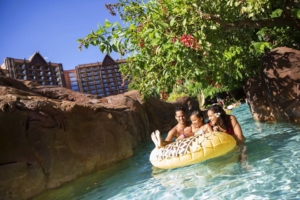Pool safety during summer family travel
It’s no secret that summer is prime time for family vacations, and many wandering pods build their trips around resort hotels with pools. This makes pool safety an important part of the family travel experience. Sure, many resorts employ their own lifeguards to keep visitors from putting themselves in danger. Still, the responsibility to keep kids safe falls almost squarely on us moms and dads.
To get a better idea of how parents can promote pool safety when they travel with kids, I chatted recently with Dr. Kristie Rivers, a Bundoo pediatrician who also serves assistant medical director of the pediatric hospitalist program at Chris Evert Children’s Hospital in Fort Lauderdale, Florida. Rivers specializes in child safety. Here are some of her most salient tips.
The resort is not responsible for your kids. “As parents you have to always be on guard, whether you’re at home or at a water park or public pool,” Rivers says. She notes that just because a lifeguard is present doesn’t mean your kids will avoid injury.
No running. “Those signs are up for a reason—running around pools usually leads to slipping, and slipping can create all sorts of injuries,” says Rivers. “I tell my own kids that when they’re near a pool they need to walk at all times. That way it is second nature, and they’re never tempted to do anything else.”
Be aware. Rivers notes that it’s critical for every family to establish pool rules and enforce them without fail. “No playing around the drains—if a child’s hair gets caught, that child could drown,” she says. Rivers advises that families should prohibit breath-holding games, and only should allow children to jump or dive into deep ends (with at least 5 feet of water), provided they know how to swim.
Avoid the ickies. “Parents may not realize that the chlorine in a pool doesn’t kill germs instantly,” Rivers says. “E. coli, norovirus, and giardia all can be found in pool water that’s heavily chlorinated, and if kids swallow even just a little bit of the water that’s contaminated, they can get sick.” She also adds that the potential germs carried by diarrhea in resort pools can be just as problematic, and recommends that if parents or children see “floaters,” they should report them to a lifeguard or other staff member immediately. “If your child has had diarrhea at any point in the last two weeks, he or she should not go into a pool,” she declares.
Mind the nappies. There’s a reason diaper companies make swimmy diapers—regular diapers aren’t designed to hold in poop and pee when they get wet. Rivers notes that parents ALWAYS should put their children in swimmy diapers, even if it means making a special trip to the store to buy them. “It’s common courtesy,” she quips. “Even babies can spread germs.” She adds that parents should check swimmy diapers every 30-60 minutes, and change them immediately when the diapers become soiled.
Practice sun safety. Even the sunscreens that say they’re waterproof really aren’t. The lesson, according to Rivers, is to reapply on the kids every hour. “Once you reapply, give the sunscreen a few minutes to work,” she says. “The last thing you want is to be diligent about reapplying, then have it all come off because you didn’t follow simple instructions on the bottle.”
Just say ‘no’ to floaties. Here’s a shocker: the American Association of Pediatrics does not recommend floaties for your kids. “Floaties give them a false sense of buoyancy,” explains Rivers. “Also, they can deflate without warning and might put your child in danger.” She notes that floaties even can lull parents into a false sense of security. To avoid this, just say no.
Regulate temperature. Believe it or not, pools often are not warm enough for infants. In fact, Rivers says that infants under six months old probably shouldn’t be in the pool for more than ten minutes at a time. “It sounds crazy, but they could develop hypothermia,” she reveals. “At the first sign of shivering, get your baby out of the water right away and wrap him up in a warm towel.”



